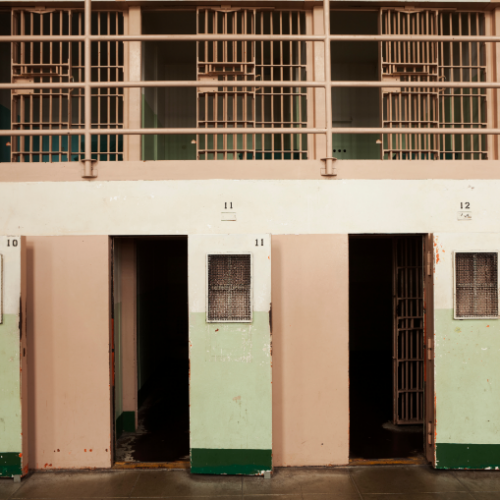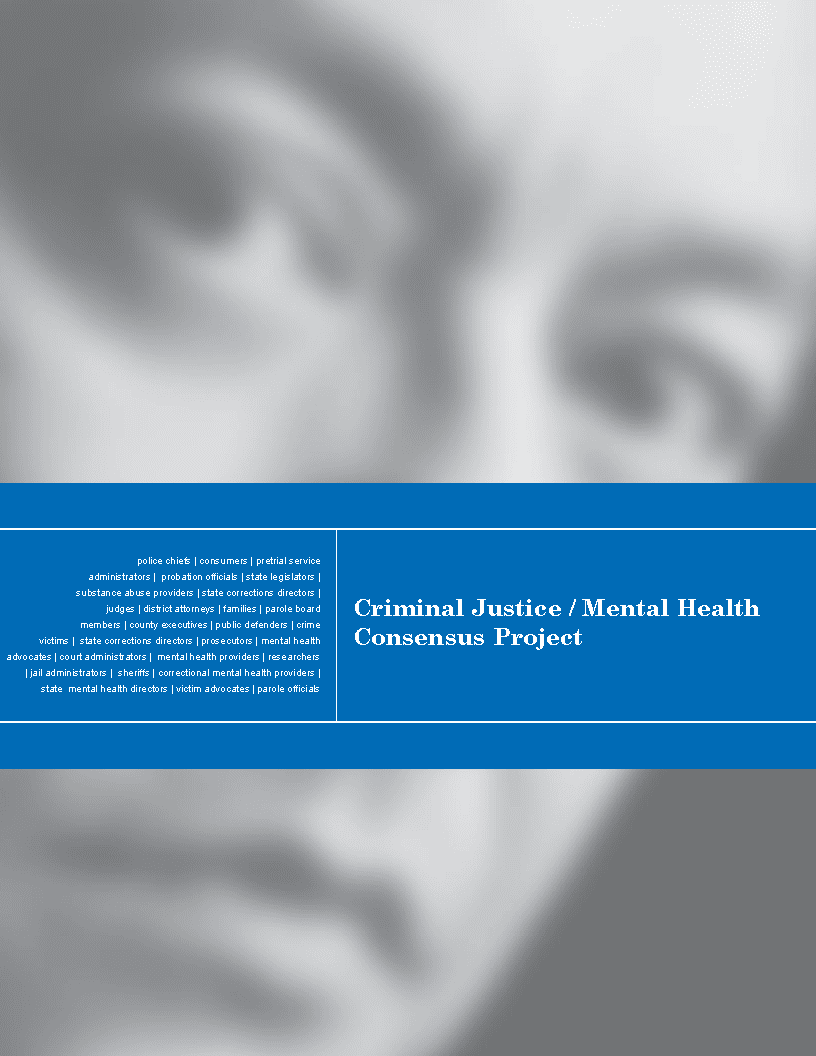The Consensus Project Report
Criminal Justice / Mental Health Consensus Project
The Criminal Justice / Mental Health Consensus Project is a unique effort to define the measures that state legislators, law enforcement officials, prosecutors, defense attorneys, judges, corrections administrators, community corrections officials, and victim advocates, mental health advocates, consumers, state mental health directors, and community-based providers agree will improve the response to people with mental illness who are in contact (or at high risk of involvement) with the criminal justice system.
The target audience of the Consensus Project Report is those individuals who can be characterized as agents of change: state policymakers who can have a broad systemic impact on the problem and an array of practitioners and advocates who can shape a community’s response to the problem. Legislators, policymakers, practitioners, and advocates can champion the detailed recommendations in the report knowing that each has been developed and approved by experts from an extraordinarily diverse range of perspectives who work in and administer the department, agencies, and organizations trying every day to address the needs of people with mental illness involved (or at risk of involvement with) the criminal justice system.
The Consensus Project Report addresses the entire criminal justice continuum, and it recognizes that actions taken by law enforcement, the courts, or corrections have ramifications for the entire criminal justice system. The report also recognizes that people with mental illness who are involved with the criminal justice system live in or return to communities, each of which has distinct issues, challenges, assets, and potential solutions to enable people with mental illness to avoid or minimize involvement with the criminal justice system.
The report provides 47 policy statements that can serve as a guide or prompt an initiative to improve the criminal justice system’s response to people with mental illness. Following each policy statement is a series of more specific recommendations that highlight the practical steps that should be taken to implement the policy. Woven into the discussion of each recommendation are examples of programs, policies, or elements of state statutes that illustrate one or more jurisdiction’s attempt to implement a particular policy statement. While promising, many of these initiatives are so new that they have yet to be evaluated to certify their impact on individuals and systems. Still, they demonstrate how partnerships and resourcefulness can be successfully replicated or tailored to the unique needs of a variety of communities. These examples should also help communities to build on the achievements without duplicating the failures or inefficiencies of others.
State and local government officials and community leaders can use these policy statements, recommendations, and examples to get beyond discussing the issue and to begin developing initiatives that will address the problem.
A positive school experience, where a child feels secure, is essential for their well-being. However, for many children…
Read MoreWhen returning to their communities from criminal justice settings, people with behavioral health needs face barriers in accessing…
Read More Supporting Children of Incarcerated Parents: Reimagining School and Community Collaboration
Supporting Children of Incarcerated Parents: Reimagining School and Community Collaboration
A positive school experience, where a child feels secure, is essential for their well-being. However, for many children with incarcerated parents—one in 14 in the U.S.—school can feel far from safe due to stigma, trauma, and a lack of understanding.
Read More Bridging Communities and Correctional Systems: Q&A with CSG Justice Center Advisory Board Member Commissioner Nicholas Deml
Read More
Bridging Communities and Correctional Systems: Q&A with CSG Justice Center Advisory Board Member Commissioner Nicholas Deml
Read More
 Assigned to the Cloud Crew: The National Incarceration Association’s Hybrid Case Management for People with Behavioral Health Needs
Assigned to the Cloud Crew: The National Incarceration Association’s Hybrid Case Management for People with Behavioral Health Needs
When returning to their communities from criminal justice settings, people with behavioral health needs face barriers in accessing basic needs—including food, housing, employment, transportation, education, clothing, and substance use and mental health services—which increases their risk of experiencing a crisis.
Read More Meet the Medicaid and Corrections Policy Academy Mentor States
Meet the Medicaid and Corrections Policy Academy Mentor States
New Hampshire Department of Corrections Commissioner Helen Hanks presents at the Medicaid and Corrections Policy Academy in-person meeting.
Read More Taking the HEAT Out of Campus Crises: A Proactive Approach to College Safety
Taking the HEAT Out of Campus Crises: A Proactive Approach to College Safety
The sharp rise in school shootings over the past 25 years has led school officials across the U.S. to take a closer look at ways to keep students safe. For Chaffey College in Rancho Cucamonga, California, a tragic incident at a nearby university hit close to home and spurred campus leaders to revisit their own school’s threat assessments and crisis responses.
Read More











